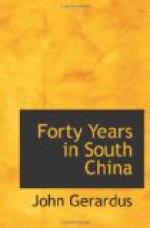“Much must be left to their discretion, prudence and judgment. But of the wish and expectation of this Synod to have their action conform as soon as may be to the resolutions of 1857, your committee think the brethren at Amoy should be distinctly informed. They therefore offer the following:
“’I. Resolved, That the General Synod, having adopted and tested its plan of conducting foreign missions, can see no reason for abolishing it; but, on the contrary, believe it to be adapted to the promotion of the best interests of foreign missionary churches, and of the denomination supporting them.
“’II. That the Board of Foreign Missions be, and hereby is, instructed to send to our missionaries at Amoy a copy or copies of this report, as containing the well-considered deliverance of the Synod respecting their present relations and future duty.
“’III. That the Secretary of the Foreign Board be, and hereby is, directed to send to the Rev. Dr. Hamilton, of London, Convener of the Presbyterian Committee, a copy of this report, with a copy of the action of 1857, and that he inform him by letter of the wishes and expectations of the Synod respecting the ecclesiastical relations which this body desires its churches in Amoy to sustain to it.’”
In the report of the Foreign Committee of the English Presbyterian Church for 1863, the following language is used in reference to the Union Chinese Church of Amoy:
“We are hopeful, however, that on further consideration our brethren in America may allow their missionaries in China to continue the present arrangement, at least until such time as it is found that actual difficulties arise in the way of carrying it out. ’Behold, how good and pleasant it is for brethren to dwell together in unify,’ and there are few brethren towards whom we feel closer affinity than the members of that Church, which was represented of old by Gomarus and Witsius, by Voet and Marck, and Bernard de Moore, and whose Synod of Dort preceded in time and pioneered in doctrine our own Westminster Assembly. Like them, we love that Presbyterianism and that Calvinism which we hold in common, and we wish to carry them wherever we go; but we fear that it would not be doing justice to either, and that it might compromise that name which is above every other, if, on the shores of China, we were to unfurl a separate standard. We would, therefore, not only respectfully recommend to the Synod to allow its missionaries to unite presbyterially as well as practically with the brethren of the Reformed Dutch Church; but we would express the earnest hope that the Synod of the sister Church in America may find itself at liberty to extend to its missionaries a similar freedom.”
These sentiments were unanimously adopted by the Synod of the English Presbyterian Church.
The cause which Mr. Talmage was advocating was too near his heart, and his convictions were too strong to permit silence. He prepared a pamphlet, setting forth more clearly the position of the Mission at Amoy, as well as answering objections made to it. [The exact standing of missionaries in the Union Chinese Church of Amoy was also explained by Dr. Talmage in a later pamphlet, for the contents of which see Appendix.] A few quotations read:




